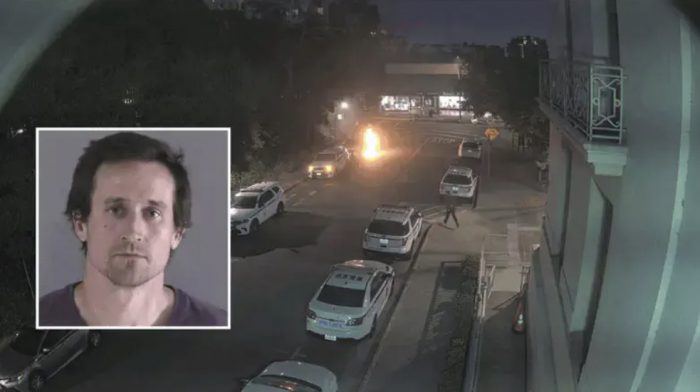A pro-Palestinian activist who launched violent firebomb attacks in Berkeley and Oakland was sentenced to nearly two decades in federal prison after calling for an “intifada” on U.S. campuses.
San Francisco — Sept. 27, 2025 — A federal judge sentenced Casey Goonan, 35, to 19 years in prison for firebombing a police vehicle and attempting other Molotov cocktail attacks in California during a wave of violent pro-Palestinian protests last year.
Prosecutors said Goonan targeted a UC Berkeley campus police vehicle and a federal courthouse in Oakland in June 2024, and admitted to planning attacks on additional sites “in the name of Palestinian liberation.”
No injuries were reported, but federal prosecutors underscored the severity of the violence.
Extremist Pamphlet and Hamas Rhetoric
Court documents revealed that Goonan also authored a pamphlet calling for copycat arsons and vandalism, labeling the campaign “Operation Campus Flood” — a reference to Hamas’s Oct. 7, 2023 massacre in Israel, which the terror group named the “Al-Aqsa Flood.”
The pamphlet featured slogans such as: “Knife to the throat of Zionism. Death to Amerikkka.”
Prosecutors said this rhetoric, paired with violent action, placed Goonan squarely in the category of political extremism.
Courtroom Drama
In a letter to the court, Goonan admitted they were radicalized during university studies, claiming the “genocide in Gaza” instilled a “profound sense of complicity.” They also cited personal mental health struggles, including bipolar disorder, but prosecutors emphasized that the attacks were planned and deliberate.
U.S. Attorney Craig H. Missakian said:
“Freedom of expression and peaceful protest are deeply enshrined values in America. But the use of violence to achieve political aims — or to silence those with whom you may disagree — has no place in our community and our country. Anyone who crosses that line will face the full force of the law.”
Support and Backlash
Some fringe activists fundraised for Goonan’s legal defense, while far-left websites tried to portray them as a “political prisoner” of the pro-Palestinian movement. An anonymous post on the platform Unravel claimed Goonan was abandoned by the broader movement and argued for building a militant “support infrastructure within and between prison walls.”
But Jewish community leaders in Northern California welcomed the sentence, calling it a necessary warning against the escalation of antisemitic violence cloaked as activism.
Why It Matters
The case underscores how extremist rhetoric surrounding Gaza has spilled into U.S. cities and campuses, with radicalized activists attempting to mimic Hamas tactics. Authorities warn that Goonan’s case is a stark reminder: violent extremism, whether at home or abroad, will not be tolerated.





